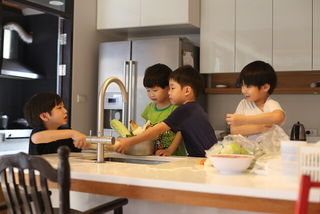Productivity
Children, Chores, and Happy Productivity
It’s worth your time to insist that your child do household chores.
Posted August 6, 2019 Reviewed by Devon Frye

Busy parents often find it easier to do household chores themselves, or to hire someone to do them, rather than ask their children. They don’t want to spend precious family time nagging the kids about chores, and it’s faster just to load the dishwasher or sweep the floor themselves.
But that attitude is terribly short-sighted and doesn’t end well for parents or for kids. Most parents will eventually resent a child or adolescent who sits around expecting others to take care of their daily needs, and kids who don’t learn how to manage household tasks will eventually have to learn those skills, or be a burden on a roommate or partner.
As early as two, and sometimes even younger, a child can enjoy making a contribution to the smooth running of their household. It’s best to use a young child’s desire to please the adults in their life as a natural springboard for teaching them some of the tasks involved in keeping a home functioning.
If you’ve missed that window, though, and your child is now six or older and still isn't doing chores, it isn’t too late—but you’re most likely going to have to work to move past the sense of entitlement that so easily creeps in when kids aren’t expected to contribute.
Why Should You Give Your Child Chores?
- Competence. Your child will learn real-world skills that will serve them well in the short term as well as later on.
- A sense of responsibility. Kids who do chores learn to take responsibility. Instead of letting others do the work, they look for ways to contribute.
- Self-esteem. Kids feel better about themselves when they contribute to the smooth functioning of their family.
- Confidence. The competence your child develops in doing household chores leads to easy self-confidence.
- Happiness. In a large study, researchers concluded that kids who spent more time helping their family reported greater feelings of happiness than those who helped less.
- Empathy. In another large study, a researcher found that children who do chores are more empathetic adults.
- Psychological adjustment and career success. The same longitudinal study found that adults who had done chores as children were better adjusted, had better relationships with friends and family, and were more successful in their careers.
- Family connection. Kids who help at home feel closer to their parents and are less likely to feel disconnected as teenagers.
- Self-regulation. Doing chores helps children learn to persevere, and to delay gratification, to take care of what needs doing first. This is a big part of success in every kind of endeavour.
- Kindness. Children who do chores see what needs to be done, and are more likely to pitch in when others need them.
- Gratitude. Doing chores helps kids realize all that goes into keeping a household running smoothly. They move from an attitude of entitlement to one of gratitude.
- Mindfulness. A child who does chores is learning to pay attention to their environment and to be present in the moment.
How Can You Encourage Your Child to Enjoy Doing Chores?
- Include your child in daily life activities. Take them to the grocery store with you and discuss what you’re buying and why. Once your child is old enough to lift a small plate from the dishwasher (age two or so), let them help you unload the dishwasher. Once your child is old enough to fold a napkin or washcloth, let them help you with the laundry.
- Get organized. It’s easier for children to keep their toys and clothes tidy if they have designated places for them. It’s easier for them to help out with other chores if there are kid-friendly shelves and cleaning tools.
- Be positive. Especially in the early stages of learning to do a chore, ignore what your child has omitted or done wrong. Instead, look for what you can praise. “You got that sheet nice and smooth!” or “The floor looks so much cleaner now!”
- Praise effort as well as achievement. “You worked so hard to get the shovel clean!”
- Be patient. Your child will be slower than you at whatever task it is that needs doing. They will be even slower in the early stages, when they’re just beginning to learn.
- Lower your standards. As with any learning process, there is a learning curve with chores. Be realistic about what is possible and reasonable, and let that be good enough.
- Make it a habit. Set certain chores at certain times of the day or week. Maybe snack time happens only after the toys have been tidied, or screens are turned on only after outdoor clothes are put away.
- Make it a privilege. “You are old (or strong, or tall, or careful) enough now that I think you can start making your bed (or taking out the garbage, or putting away the cups)."
- Be grateful. Help your child see how they are contributing to the well-being of the family.
- Set up a reward system. Encourage a positive attitude toward chores by associating them with rewards. “When we’ve finished sweeping the floor, we can go to the park, or do some chalk drawing on the sidewalk. Your call.”
- Do teamwork. Most kids enjoy activities more when there is a social component. With chores, that means doing it together, at least until the child has mastered it and can take pleasure in doing it alone.
- Make it fun. Keep the spirit positive and light during chore time. Add whimsical flourishes wherever possible. Make up a silly song, get a pink feather duster, do a twirl.
- Give choices. Try to include an element of choice in your child’s chores. For example, they might choose to set the table, pick up the toys, or unload the dishwasher.
- Don’t scold. Instead, build in consequences. The best kind of consequence connects to the chore itself. For example, a child who doesn’t do a designated chore before dinner misses out on an after-dinner activity until the chore is finished. A child who refuses to do a chore loses optional privileges; for example, screen time can be contingent on chore completion.
- Collaborate. Have a family meeting to discuss which chores the child should take responsibility for, and when. Give the child a say in the discussion. Set out the chores (perhaps with photos, pictures, or drawings) on a piece of paper, including rewards, as well as consequences for non-completion. Post the chore agreement on the fridge.
- With larger projects, create a system of small tasks. I was at my daughter’s home, with her and her four-year-old twins. The backyard was littered with dirty toys. We set up two pails filled with warm soapy water and cleaning cloths, as well as a rinsing bucket. We started by sorting the pieces, deciding whether to discard them because they were broken, give them away to younger kids, or clean them. We then took turns taking toys to the cleaning stations, rinsing them, and setting them out in the sun to dry. The kids rotated around the various chores, with the adults filling in as needed. At the end of about ninety minutes, we all took enormous pleasure in having worked hard to create a clean yard, a pile of toys to give away to younger children, and a drying station full of clean, usable toys.
It’s hugely important for kids to do household chores, and totally worth your time and trouble. If you’re lucky, your kids will even thank you one day.
For More on Kids and Chores
More Chores, Less Play: Teaching Children Self-Regulation, by Michael Ungar
How to Get Your Children to Do Chores, by Dan Mager


